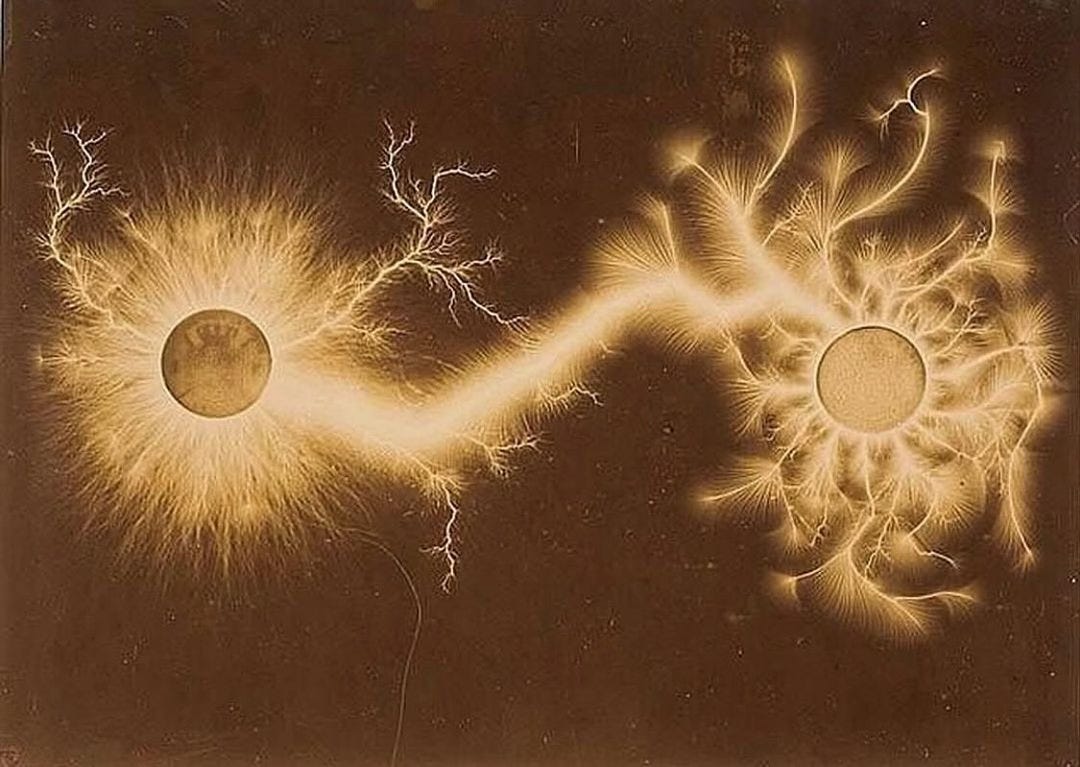Why "Electra Complex"?
It's a feminine word play on the electricity system's complexity, yes. It's also a personal psychological integration to reform power structures.
Desire, loyalty, rivalry, grief, rage, powerlessness, and awakening. What could all of these themes have to do with writing about systemic, technical, and energy transitions? Everything, of course.
I’ll dissect the psychological meaning of the Electra Complex first, to then relate it to the title and purpose of this publication — planting the seeds of a manifesto.
What is the Electra Complex?
The Electra Complex was originally defined by Freud as "penis envy", experienced by a female, involving a daughter’s wish to take the mother's place as the father's object of affection. He stated the resolution was through identification with the mother.
Jung translated this to mean it was more of an internal fixation with logic, authority, and power. These qualities are projected onto the masculine (first symbolised by the father) and externalised as being something sovereign beyond the female self.
Resolving the complex, according to Jung, requires Electra women to integrate the animus with those externalised traits — pragmatism, drive, rationality — within. Feminist responses have reframed the Electra Complex as a desire for power and legitimacy in relation to having authority in a traditionally patriarchal system.
This father-fixation can be likened to being blindly compliant as all authority, wisdom, and drive are outsourced to the patriarchal system inherited — business or public, the nature of the system is political, even if its traces are material.
Hence, to resolve the Electra Complex is to offer an integrative resolution.
Sovereign structure, authority, and recognition are what halt the fixation on parental projections.
These qualities brand power-seeking as a sovereign quest. This quest is not dictated by compliance or rebellion, but a clear delineation of values.
Authority is relational. Just like power, it does not exist in a vacuum. Power cannot be had in isolation. It must be confirmed by others. External validation is intrinsic to authority and power. Speaking only of self-integration is insufficient. It is an illusion to think authority is not relational and reliant on meaningful validation.
Hence, I have created this publication.
My resolution is rooted in presenting feminine, ecological, and emotional perspectives whose ultimate aim is not to simply be lauded by the patriarchal system and its adepts— but to challenge it into integrating new perspectives.
These perspectives are backed by values of emotionality, compassion, and caretaking. These are values that are defined by Jung as the anima (which is the traditionally feminine principle that exists within a person of any gender).
Working in traditionally masculine-dominated fields or harbouring ambitions of becoming a public authority usually requires deprioritising these anima qualities.
Gracefully challenging power integrates the longing for power beyond envy, and instead, delivers it through clarity of vision.
I personally do this by identifying with the mother and the othered. This is fairly easy for me: female, Colombian, Spanish, immigrant, working class.
What I propose in this publication is the examination of economic, energy, and social systems as manuscripts without parental glorification, and without infantilising an emotional perspective.
It is integrating the inner feminine with the qualities of authority often projected in patriarchal institutions and leaders — regaining it with integrity.
The aim is to do so by balancing both technical rigour1 and a humane focus on the psychological-emotional dynamics underneath these systems2. When these projected authorities and dismissed identities blend into integrated archetypes3, an integration occurs.
We don't want the father. We want the god behind the father — but we forget that god is also within.
Marion Woodman
This is my way out of being caught up in power dynamics with trifling victories, and to channel my tenacity into something of lasting value. As a woman, it is vital that the quest for power, authority, and legitimacy does not become a quest for vapid validation, but a genuine offering of authority with care.
As a human, to balance material practicality and emotional pondering into the realm of systemic analysis and reform is to make an undeniable contribution.
The purpose is to break the obsessive spell of the personal navel-gazing and callous profit-making in favour of a greater purpose that can benefit the self and others.
I invite all readers to engage, and any female readers to collaborate and contribute.
The last thing the world needs is to remain the way it is, anyway.
Valeria Reinoso
The animus is the inner masculine — a shorthand for logic, rationality, and materialism.
The anima is the inner feminine — aligned with compassion, caretaking, and emotionality.
Marion Woodman’s work veers toward the talk of the soul, an unwelcome subject in technical fields. Yet it’s quite an inspiring and daring take to weave in with electricity and political-material discussions. Any woman working in a technical field, more recently interested in somatic practices and mindfulness will find her works — such as Addiction to Perfection — interesting.


